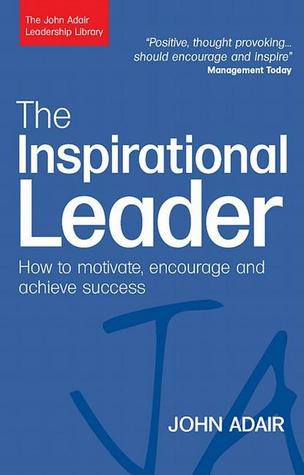The Inspirational Leader Summary
4 min read ⌚
 How to Motivate, Encourage and Achieve Success
How to Motivate, Encourage and Achieve Success
Unlike poets – explains John Adair in “The Inspirational Leader” – leaders are not born, but made. Hence, the need for this book, in which Adair gives future leaders many philosophically sound lessons on how to motivate and encourage people and, subsequently, achieve success.
About John Adair
John Eric Adair , a British writer, is the leading authority on leadership and related matters in Europe. He usually draws upon his military experiences to write about what it means to be a leader in the business world. He is the President of Adair International and the author of books such as “Not Bosses But Leaders,” “The Leadership of Muhammad,” “The Leadership of Jesus” and many more.
, a British writer, is the leading authority on leadership and related matters in Europe. He usually draws upon his military experiences to write about what it means to be a leader in the business world. He is the President of Adair International and the author of books such as “Not Bosses But Leaders,” “The Leadership of Muhammad,” “The Leadership of Jesus” and many more.
Read more at http://www.johnadair.co.uk/.
“The Inspirational Leader Summary”
We wrote something about Rainer Maria Rilke here. Well, during the first few years of the twentieth century, he wrote ten letters to a young military cadet who wanted to become a poet.
These letters are now considered to be some sort of a manual for young poets.
John Adair mimics the structure in “The Inspirational Leader” which is written in the form of a series of discussions between the author and a young chief executive. So you can consider it as some sort of a leadership manual for young heads of companies.
The discussion begins in medias res: “I have been thinking about your point,” says the young CEO, “that there are no short cuts, no easy solutions to becoming an inspiring leader.”
The point is there from the start: you must train your way to become a good leader. And a good training begins with defining good leadership.
In the opinion of Adair, it has three foundational traits: understanding your qualities, your situation, and your function.
Understanding your qualities is the only part which really has a connection with your genetic predispositions. However, talent is not enough, i.e. you must dedicate some time to improving your strengths in order to stand out.
Courage, optimism, persistence, morality – these are only few of the characteristics great leaders have. Some say there are many more. And, probably, they are right.
However, the most important characteristic – the one you need to spend most of the time improving – is certainly enthusiasm. It attracts good employees and energizes them during your joint road to greatness.
Now, this is not enough.
No matter how good of a leader you inherently are, you must be aware of the situations you are in. Because, some situations ask for some parts of your character, other for others.
Your leadership, after all, stems from one or more of three reasons.
First of all, your position. You may be a leader for the simple reason you have a superior position than the rest. Of course, this is the weakest type of leadership, the one which has no relation to your qualities, but to your stroke of luck.
Secondly, your personality. Leaders can exude authority simply by being who they are. In other words, if you possess charisma and charm, you’re pretty likely to attract attention and followers.
And finally, your knowledge. If you know more than anyone, people will listen. And come to you for advice. You’ll become a leader in no time.
However, there’s another way to become a leader. This is the functional approach. Even if you lack authority in terms of knowledge and personality, you may be able to be a good and inspirational leader simply by understanding the function better.
Smart leaders, for example, are great at delegating responsibilities. They plan well and organize even better. And they are capable of developing a good reward/punishment system based on fairness and in-depth evaluation.
After all, who wouldn’t want to listen to such a leader?
Key Lessons from “The Inspirational Leader”
1. Who You Are as a Leader: Your Qualities
2. What You Know as a Leader: Your Situation
3. What You Do as a Leader: Your Function
Who You Are as a Leader: Your Qualities
To be a good and inspirational leader, it’s always important to first know your true self. In other words – nobody likes somebody who hides his weaknesses or isn’t in touch with his strengths. Admit the former; improve the latter. And no matter what: be passionate and enthusiastic. You have a team to lead, and they’ll mirror your behavior for most of the time.
What You Know as a Leader: Your Situation
Churchill was a great wartime leader – but a fairly average one once the war ended. Hell – even the genius of an Einstein isn’t transferrable! So, understand your situation well if you like to be a good leader. You may be there because, well, you’re there, or because you have the personality or the knowledge of a leader.
If you are a leader merely because of your position, it’s very dangerous to confuse the source of your authority and think it’s stemming from your knowledge or personality. In fact – in that case: better have a look at Key Lesson #3.
What You Do as a Leader: Your Function
Now, if you are a leader because of your position – and not because of your knowledge or personality – then dedicate yourself to mastering some other qualities. Such as – delegating, planning, communication, support, inspiration, and, finally, evaluation.
Like this summary? We’d Like to invite you to download our free 12 min app, for more amazing summaries and audiobooks.
“The Inspirational Leader” Quotes
Put a person in one situation and they will be accepted as a leader; change the situation and they won't. Share on X Only those who are demanding of themselves can inspire great things in others. Share on X I prefer to have too much confidence, and thereby be deceived, than to be always mistrustful. For in the first case, I suffer for a moment at being deceived, and, in the second, I suffer constantly. Share on X Transcendent common sense is the rare power of seeing things as they are, which signifies genius. It is the ability to draw right conclusions and to take correct action. Share on X It's no good just having a great leader at the strategic level if your organization is useless at the team and operational levels. Share on X
Emir is the Head of Marketing at 12min. In his spare time, he loves to meditate and play soccer.


 How to Motivate, Encourage and Achieve Success
How to Motivate, Encourage and Achieve Success



